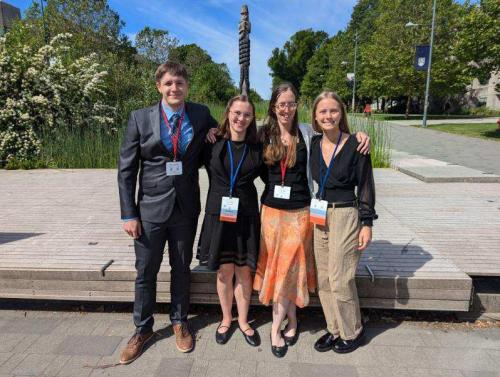In June 2024, Assistant Professor of Genetics Dr. Ashley Beck traveled to Vancouver, British Columbia, with three of her undergraduate research students to visit the University of British Columbia (UBC) and present the findings from their research project conducted at Carroll College.

Dr. Beck was awarded National Science Foundation funding through the Research in Undergraduate Institutions (RUI) initiative, which provided the funds to travel and present at the North American Congress for Conservation Biology. Her three undergraduate research students – Elliot Wald, June LePage, and Hunter Wetherelt – presented their work entitled, “Impacts of Urbanization on Peromyscus Sonoriensis Microbiome and Health”. Their talk was well received and was one of the only talks presented by undergraduate researchers at the conference.
Their presentation focused on the first results from Dr. Beck’s RUI grant-funded project, a collaborative effort with the University of Portland and Gonzaga University to characterize the wildlife health impacts of human-altered habitats using the western deer mouse (Peromyscus sonoriensis) as a model organism. Students were involved throughout the entire research process, participating in field research in Spokane, WA for two weeks collecting soil and fecal samples from urban/rural parks, followed by several weeks in Carroll College’s laboratories analyzing the microbiome of the samples with Nanopore sequencing to understand how microbial community composition plays a role in ecosystem health. In the long term, this microbiome data will be combined with other health, immune, and stress data collected by the University of Portland and Gonzaga University to build a mechanistic model to predict how the different aspects of wildlife health and environment interact with and affect one another.
Working in Dr. Beck's lab has been one of the most impactful experiences I have had at Carroll. Her guidance and expertise are invaluable and it was an honor to represent her research at the NACCB conference at UBC. Connecting with other passionate people and sitting in on conversations about the field surrounding conservation has left me with so much to think about and apply to future work.
~ June LePage, senior Biology major
While at UBC, they had the opportunity to attend a variety of sessions and talks regarding conservation biology, highlighting the many intersecting disciplines that are involved in conservation biology research and application. This year’s conference theme was “Celebrating Diversity in Conservation from Summit to Sea” and focused not only on the interdisciplinary nature of conservation biology but also emphasized the indigenous perspective on conservation research and provided opportunities to learn about the native peoples of the Pacific Northwest. They also had the opportunity to tour the Beaty Biodiversity Museum on campus.
My journey to Vancouver, Canada, was nothing short of incredible. We delved deeply into conservation efforts, uncovering numerous innovative strategies to mitigate human and climate impacts. Additionally, we had the privilege of presenting our research to a large audience, experiencing the entire scientific process from sample collection to DNA extraction and analysis, culminating in our final presentation. Working with Dr. Beck was an invaluable part of this experience; her mentorship significantly contributed to my growth as both a person and a scholar. I am immensely grateful for her guidance and support throughout this journey.
~ Hunter Wetherelt, Biology graduate, matriculating into Touro College of Osteopathic Medicine in Great Falls
Carroll's small size, individualized faculty mentorship, and unique focus on high-caliber undergraduate research, including recognition by federal grant awards, provide extraordinary opportunities for our undergraduate students that are uncommon at other colleges and universities. Dr. Beck will also present the research findings in August at the International Symposium for Microbial Ecology in South Africa.

